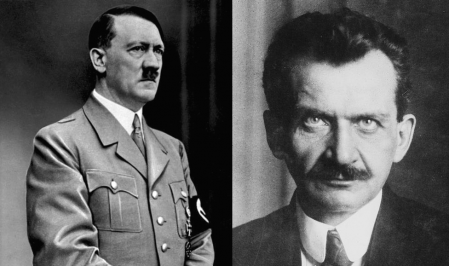By: Inoljt, http://mypolitikal.com/
In any given year, every politician will probably make several dozen speeches. The vast majority of these will be forgotten instantly; even prime-time presidential speeches fade from the news cycle after a couple days. Indeed, history may only remember one out of the thousands of speeches given over a political leader’s term.
One such memorable speech was given by a Mr. Otto Wels. A German politician belonging to the Social Democratic Party, Mr. Wels spent more than a decade in politics and eventually became the party’s Chairman. He must have given a number of speeches throughout this time.
Yet out of all the time Mr. Wels spent as head of his party, history remembers only one speech of his. Today it is overshadowed in light of the great and terrible events that came after, but nevertheless worthy of recalling.
The date is March 1933, the place Germany’s parliament. The occasion: Chancellor Adolf Hitler and his National Socialist Party are proposing an Enabling Act after unknown assailants burned down the Reichstag building last month.
More below.
This will transfer all legislative powers to the executive under Mr. Hitler. It will make Germany a one-party dictatorship.
With Hitler’s armed Brown-shirts standing right there as voting takes place, the Enabling Act passes by a 4-to-1 margin. All the parties, save one, vote for it.
Last of all stand the Social Democrats, and to a man they vote against Hitler’s Enabling Act – right in front of the Nazi stormtroopers. Even today the party prides itself in its actions on that fateful day. Otto Wels moves up to make a speech assailing the Enabling Act – the only opposing speech that day. A translated transcript can be found here.
To be honest, it is not a particularly memorable speech. Mr. Wels spends much of it defending his party; at times the flow is quite jumpy. One almost gets the feeling that it is politics-as-usual, not a moment that will be frozen in history. Nevertheless, Wels gets off some good lines:
Freedom and life can be taken from us, but not our honor.
We stand by the principles enshrined in, the principles of a state based on the rule of law, of equal rights, of social justice. In this historic hour, we German Social Democrats solemnly pledge ourselves to the principles of humanity and justice, of freedom and socialism. No Enabling Act gives you the power to destroy ideas that are eternal and indestructible.
When Wels ends, there is chaos in the room. The Social Democrats applaud; Hitler’s supporters, who outnumber them, raise a cacophony booing.
Then Hitler himself gets up and launches an epic attack on the Social Democrats. It is a quite unforgettable response (one can listen to this speech; the first part is here, the second here, and the conclusion here):
We National Socialists will now clear the path for the German worker leading to what is his to claim and demand. We National Socialists will be his advocates; you, Gentlement, are no longer necessary!
You think that your star will rise again? Gentlemen, Germany’s star will rise and yours will fall!
Everything that becomes rotten, old, and weak in the life of a people disappears, never to return. Your death knell has sounded as well.
I do not even want you to vote for it. Germany will be liberated, but not by you!
On balance, Hitler’s speech is by far the more effective of the two. Unlike Wels, he has two clear themes: the German people and the wrongs done to Germany after WWI. He blames the Social Democrats for the latter and skillfully wields the card of German nationalism.
Moreover, Hitler has three advantages over Wels. Firstly he is a brilliant speaker, the best – perhaps – in German history. He is excited and angry, emotional and quite able to rouse an audience. To this day Germans are suspicious of politicians with impressive speaking skills.
Secondly, the Social Democrats had somewhat naively released copies of Mr. Wels’s speech to the media. It had then found its way to the Nazis, enabling them to pre-write a strong rebuttal.
Finally, Hitler has battalion of armed Nazi Brown-shirts in the room applauding his every word. Otto Wels was not so lucky.
Perhaps it is just, then, that history commemorates the words Otto Wels said that day and not those of Hitler. He was not a great speaker (that was Hitler), but he spoke for the side of justice. In the context of the times it was perhaps one of the bravest speeches ever spoken.
